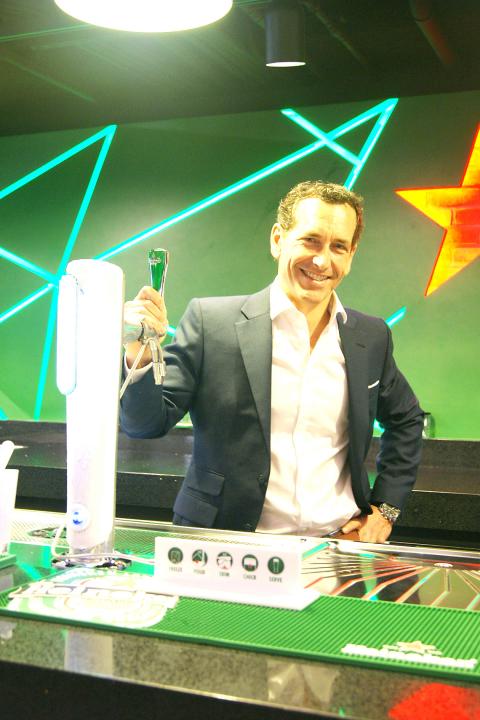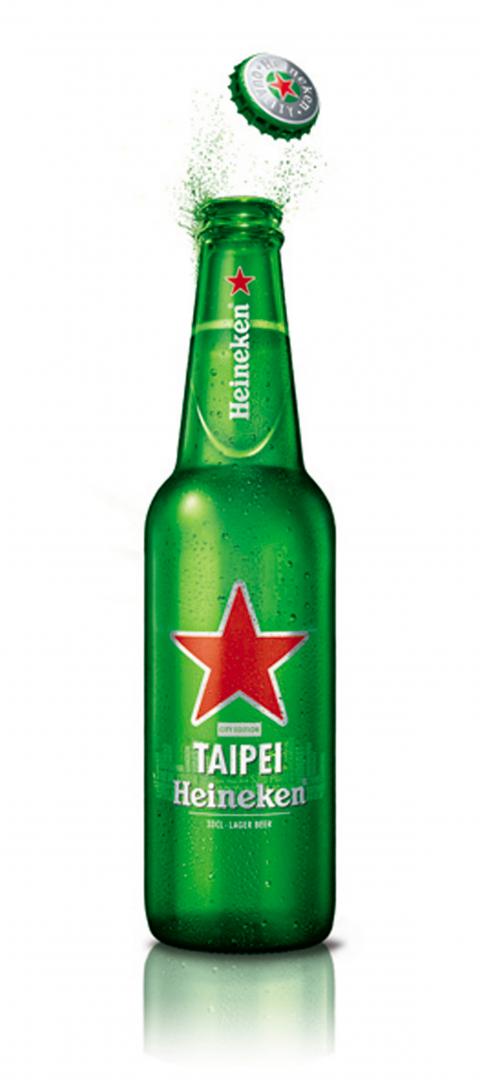Heineken, the Dutch beer producer, is proud of its 150 years of history and legacy, and yet always wants to be one step ahead.
“Heineken is innovative and always wants to bring new things to customers. I think that is part of the reason why Heineken Taiwan is successful in this country, because Taiwanese customers are very open to new things,” Heineken Brouwerijen B.V. Taiwan Branch general manager Peter Huizing told the Taipei Times in a recent interview at the company’s new Taipei office.
Being an international brand, Heineken wants to be “big and close” at the same time, Huizing said.

Warning: Excessive consumption of alcohol can damage your health
Photo: Courtesy of Heineken Taiwan
With traditional lager sales under pressure in Europe and the US, the company’s introduction of the limited edition “City Bottle” in Taiwan in August was one of its efforts to be closer to local consumers, while helping boost growth and profits.
“We live in Taiwan, we love in Taiwan, so we made a Taipei bottle... This is a way to show customers that we understand them,” Huizing said. “It also shows how important Taiwan is to the company.”
According to Heineken, it entered the Taiwanese market in 1987 and the country is its second-largest export market in the world.

Warning: Excessive consumption of alcohol can damage your health
Photo: Courtesy of Heineken Taiwan
“The brand has so much history in this country and Taiwanese drink 200 million Heinekens per year,” Huizing said.
Traditional beer markets worldwide have become saturated over the past 10 years, but the Dutch brewer aims to gain the attention of customers, especially younger people and women, with a wide selection of products and more fun.
“Open Your City” is one of Heineken’s global campaigns, with 34 cities around the world getting their own bottle.
“There are so many cities in the world and everyone would like to have their own city bottle,” he said.
Huizing and his team members had to fight very hard to get the Taipei bottle produced.
Heineken Taiwan has also introduced New York, London, Berlin, Amsterdam and Rio de Janeiro city bottles to the local market.
Huizing said the limited-edition bottles represent the different cultures of each city.
“The bottle for Taipei shows a city of energy,” he said.
Huizing said the market reaction to the Taipei bottle was positive, even bringing strong sales momentum to the company this year despite the market having gone down a little bit.
The government’s stricter measures to fight drunk driving, enacted last year, has led to the domestic beer market declining 2 percent this year, he said, adding that the market may be flat next year, citing the government’s stricter rules and the nation’s slow-growing population.
However, Heineken Taiwan’s city bottle campaign has boosted sales, bringing double-digit growth last quarter, Huizing said.
“People see the city bottle as a collectable, but more importantly, people appreciate quality products,” he said. “People see Heineken as a brand worth paying for.”
Heineken also introduced Heineken Light — a new beer that contains fewer calories — to the local market and has received good reactions from consumers, he said.
“The only way to continue growing is to innovate, and the only way to survive in the business is to take responsibilities,” Huizing said. “We believe in ‘to innovate or to evaporate.’”
However, there is no reason to sit back and relax, he said, adding that Heineken Taiwan has also been promoting responsible drinking campaign in the country.
“For a corporation, it is very important to define your role in society by taking corporate social responsibility seriously,” he said.
Commenting about the strategy for an international brand to enter a new regional market, Huizing said one of the keys is “respect.”
Heineken has three big values: Passion for introducing high quality products, respect for the environment and people around you, and bring enjoyment to customers, Huizing said.
He said before Heineken Taiwan officially landed in Tainan in 1987, the company had been working closely with local wholesalers for more than 20 years and maintained good relationships with them.
“You can only work with someone for that long a period of time when you respect each other,” Huizing said.
It is very important to respect team members as well, Huizing said, adding that business has its good and bad times and that the key to survival is to support, trust and respect each other.
“In Heineken, we don’t just say the values, we live our values,” he said.
Talking about Taiwan’s recent series of adulterated food scandals, Huizing said that the incidents have raised people’s awareness of quality food products.
“I think people value quality products more than ever,” he said.
The scandals have limited impact on Heineken because the firm produces good quality beer and people have faith in the brand, Huizing said.

The Eurovision Song Contest has seen a surge in punter interest at the bookmakers, becoming a major betting event, experts said ahead of last night’s giant glamfest in Basel. “Eurovision has quietly become one of the biggest betting events of the year,” said Tomi Huttunen, senior manager of the Online Computer Finland (OCS) betting and casino platform. Betting sites have long been used to gauge which way voters might be leaning ahead of the world’s biggest televised live music event. However, bookmakers highlight a huge increase in engagement in recent years — and this year in particular. “We’ve already passed 2023’s total activity and

Nvidia Corp CEO Jensen Huang (黃仁勳) today announced that his company has selected "Beitou Shilin" in Taipei for its new Taiwan office, called Nvidia Constellation, putting an end to months of speculation. Industry sources have said that the tech giant has been eyeing the Beitou Shilin Science Park as the site of its new overseas headquarters, and speculated that the new headquarters would be built on two plots of land designated as "T17" and "T18," which span 3.89 hectares in the park. "I think it's time for us to reveal one of the largest products we've ever built," Huang said near the

China yesterday announced anti-dumping duties as high as 74.9 percent on imports of polyoxymethylene (POM) copolymers, a type of engineering plastic, from Taiwan, the US, the EU and Japan. The Chinese Ministry of Commerce’s findings conclude a probe launched in May last year, shortly after the US sharply increased tariffs on Chinese electric vehicles, computer chips and other imports. POM copolymers can partially replace metals such as copper and zinc, and have various applications, including in auto parts, electronics and medical equipment, the Chinese ministry has said. In January, it said initial investigations had determined that dumping was taking place, and implemented preliminary

Intel Corp yesterday reinforced its determination to strengthen its partnerships with Taiwan’s ecosystem partners including original-electronic-manufacturing (OEM) companies such as Hon Hai Precision Industry Co (鴻海精密) and chipmaker United Microelectronics Corp (UMC, 聯電). “Tonight marks a new beginning. We renew our new partnership with Taiwan ecosystem,” Intel new chief executive officer Tan Lip-bu (陳立武) said at a dinner with representatives from the company’s local partners, celebrating the 40th anniversary of the US chip giant’s presence in Taiwan. Tan took the reins at Intel six weeks ago aiming to reform the chipmaker and revive its past glory. This is the first time Tan